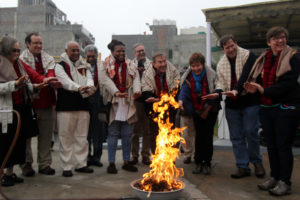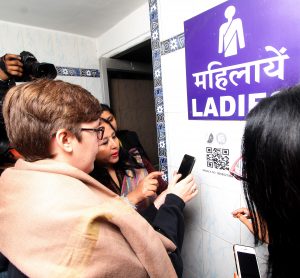NEW DELHI, January 7: It was an unbelievable moment for eight American academicians when they visited Sulabh Gram under ‘Pilgrimage of Peace’ a programme in which they try to understand the Philosophy and Work of Mahatma Gandhi. Under this Pilgrimage of peace programme they are visiting Delhi, Wardha, Sevagram, Mumbai and other places associated with the Father of the Nation.
These scholars who are associated with USA’s Cardinal Stritch University under It’s “Servant Leadership Programme’ while highly impressed with the efforts of Dr. Bindeshwar Pathak, Founder of Sulabh Social Reform Movement said that he is the greatest example to understand Gandhi and Peace. It gave glimpse of Gandhian constructive work in action in Sulabh campus located in South West Delhi.
The group joined Prayer meeting, after getting first hand experiences about various Toilets Models designed and developed by Dr. Pathak.

The team is from Cardinal Stritch University in the USA and is promoting the concept of ‘Servant Leadership’, meaning the leader should be a servant first. While lauding Dr. Pathak Prof. Mark Lewis Gesner, Professor Leadership studies of Cardinal Stritch University says, “You reflect this concept in your life with an exemplary work.”
Servant leadership begins with a vision. Today’s servant leaders see the big picture. They identify complex problems early and are able to implement workable solutions in a timely fashion by planning ahead. Servant leaders are optimists with empathy for people.
The Secretary of Sarva Seva Sangh Mr. GVVSDS Prasad, while hailing the vision of Sulabh Founder, says, “many great people in India worked for emancipation of untouchables”. But your work has the distinction of a burning desire to root out the unjust system. It was not a condescending or charity approach but identifying with them and shouldering their suffering. Mahatma Gandhi said, “I would wish to be born a Bhangi were I to be reborn” You did that in this life itself, Mr. Prasad added.
The American academicians says, “You won many prestigious awards both National and International. All of them together cannot measure the greatness of your work”. Prof Mark Lewis says, ‘with all my humility I bow to you for that great work which transformed the many lives of the most depressed of our society’.
While welcoming the guests, Dr. Pathak highlighted the fundamentals and the secondaries of Gandhi. Terming the concept of Servant Leadership Dr. Pathak said that he believed the fundamentals of Gandhi and tried his best to replicate into action.
Sulabh Founder says, ‘When I founded Sulabh in 1970, I decided to separate the fundamentals of Gandhi from the secondaries of Gandhi. The fundamentals of Gandhi are: truth, non-violence, honesty and integrity, ethics and morality, no difference in speech and action, trusteeship of wealth, welfare of people, constructive work, prohibition, sanitation, eradication of untouchability and social discrimination specially the untouchables (manual scavengers), health, village development, small-scale and cottage industries, female education, equality in all religions etc’.
Dr. Pathak observed that the Government should work as ‘Servant Leadership’. These are the fundamentals of Gandhi.
The Secondaries of Gandhi are: the food habits, the choice of wearing of cloths, freedom to choose one’s lifestyle, language, freedom of faith and expression. In the Gandhian fundamentals I adopted first the truth and second the non-violence, add Dr. Pathak.
According to Dr. Pathak, Gandhi said in 1934, “The people of India are ready to face bullets of the British, but are afraid to share food with the untouchables because of the fear of the Brahmins.”
So I invented the technology of two-pit pour-flush compost ecological toilet and popularized it in the name of Sulabh Shauchalaya, he adds.
Dr. Pathak said that this technology has helped stop the practice of defecation in the open as well as the practice of manual cleaning and physical carrying of human faeces. For improving the living conditions of the scavengers, transforming their lives and changing their destiny.
Apart from Sulabh Sauchalya and upliftment of the untouchable community, Sulabh also extend help to thousands of Widows of Vrindavan, Varanasi and Uttarakhand.


















